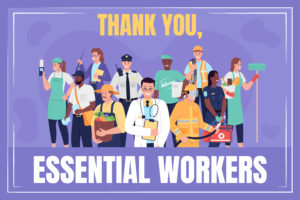Ward Law LLC is dedicated to keeping our clients informed about all things COVID-19 related. Our business is to ensure that you have all the information you need to keep your business going. In that regard, please read below for updates on the proposed Essential Workers Bill of Rights.
Next Federal Stimulus and Essential Workers Bill of Rights

On April 13th, Massachusetts Senator Elizabeth Warren and California Representative Ro Khanna unveiled a proposal for an Essential Workers Bill of Rights. The possible legislation would be intended to provide protection to essential workers who are on the front lines of the COVID-19 pandemic. Workers deemed essential include those employees who work in or for healthcare, grocery stores, pharmacies, food service, government, farms, transportation, delivery, and childcare, among others. The proposal is for inclusion of this Bill of Rights within the next coronavirus relief package.
As of early last week, talks were underway between the Trump administration and Congress on another recovery package to blunt the economic impact of the coronavirus pandemic. A second round of cash payments to Americans is part of the discussions. “We could very well do a second round,” President Donald Trump said at a White House news conference Monday. “It is absolutely under serious consideration.”
The Essential Workers Bill of Rights proposed by Sen. Warren and Rep. Khanna includes the following:
- Health and safety protections. Employers must provide every employee with necessary amounts of personal protective equipment at no cost to the employee. Also, businesses would be required to take proactive actions when someone at the job site may have contracted coronavirus, including informing employees if they may have been exposed and evacuating the job site until it can be properly cleaned. Plus, OSHA must immediately issue a robust Emergency Temporary Standard to keep employees safe.
- Robust premium compensation. Every frontline worker should receive premium pay (a/k/a hazard pay) retroactive to the start of the COVID-19 pandemic, which would not count towards workers’ eligibility for any means-tested programs.
- Protections for collective bargaining agreements. Employers cannot change or dissolve any collective bargaining agreement, including during bankruptcy proceedings, until the COVID-19 crisis ends. Workers’ rights to vote for representation must also be protected.
- Truly universal paid sick leave and family and medical leave. Fourteen days of paid sick leave and twelve weeks of paid family and medical leave.
- Protections for whistleblowers. No retaliation against workers who witness and complain about unsafe conditions on the job or know about workplace coronavirus exposure.
- An end to worker misclassification. Stronger laws against misclassifying employees as independent contractors.
- Health care security. Use public programs to provide no-cost health care coverage for all, including illegal immigrants. Plus, a full federal subsidy for fifteen months of COBRA for employees who lose eligibility for health care coverage.
- Support for childcare. More federal funding for childcare providers to ensure essential workers have access to reliable, safe, healthy, and high-quality childcare.
- Treat workers as experts. Include essential workers, and their unions and organizations, in helping to develop specific workplace safety protocols.
- Hold corporations accountable for meeting their responsibilities. Give workers a stake in how government stimulus funds are used in their workplaces. Plus, companies must use the funding for payroll retention, put workers on boards of directors, and remain neutral in union organizing drives. CEOs should be required to personally certify they comply with worker protections, so they can face civil and criminal penalties if they break their word.
While parts of the Essential Workers Bill of Rights clearly have political and partisan overtones, including specific mention of the need to prevent President Trump from too easily rolling back these certain protections, it is safe to believe that at least some of these proposed protections will be included in any new stimulus package. Whether a new stimulus package comes to fruition is still a question, but discussions continue.
For any questions about the proposed Essential Workers Bill of Rights, please email the Ward Law helpline any time at covid19helpline@thewardlaw.com.
